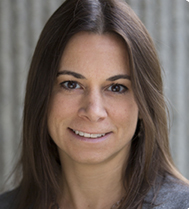UC Davis Comprehensive Cancer Center researcher Diana Miglioretti is co-senior author of a new study that shows women 75 and older who have dense breasts are at higher risk of breast cancer.
 UC Davis breast cancer researcher Diana Miglioretti helped lead study showing breast density is a cancer risk in older women
UC Davis breast cancer researcher Diana Miglioretti helped lead study showing breast density is a cancer risk in older women
The research fills an information gap and could affect whether older women receive breast cancer screening mammography.
The study was published August 26, 2021 in JAMA Network Open, an online open access journal published by the American Medical Association. Researchers examined data from more than 193,000 women age 65 and older, including more than 70,000 who were at least 75. They found a positive association between breast density and breast cancer risk.
"This study provides evidence that breast density remains an important risk factor in older women and should be included in risk prediction models that also consider life expectancy to help identify women who may benefit most from continued screening," Miglioretti said.
Miglioretti teamed up with co-senior author, Dejana Braithwaite, associate director of population sciences at the University of Florida (UF) Health Cancer Center and a professor in the UF Institute on Aging.
"Our goal is to develop the evidence that helps personalize breast cancer screening for older women," said Braithwaite. "Older women who are in good health and have dense breasts may consider a screening mammogram even as they age beyond the screening recommendations for average-risk women."
Physicians have long recognized that women with denser breasts are at increased risk of invasive breast cancer, but until now, virtually no data existed for women age 75 and older.
Right now, the U.S. Preventive Services Task Force, or USPSTF, an independent panel of national experts on disease prevention and evidence-based medicine, does not recommend for or against mammography screening after age 74. The task force says evidence to weigh risk versus benefit has been insufficient for a definitive recommendation.
Breast density is a measure of the amount of fibrous or glandular tissue compared with fatty tissue, with less dense breasts containing more fat. Roughly half of women ages 40 to 74 have dense breasts. The breasts of aging women become less dense over time, although nearly a third of all women age 65 and older still have dense breasts, Braithwaite said.
The USPSTF recommends a mammogram every two years for women in the 50 to 74 age group. American Cancer Society recommendations are slightly different, with annual mammograms suggested for women 45 and older, and then biennially after age 55 for women who are in good health.
Physicians note that not all older women would benefit from screening mammography, especially those with serious medical conditions.
The study analyzed data from the Breast Cancer Surveillance Consortium and specifically examined breast density as a breast cancer risk factor in two groups of women — those ages 65 to 74 and those who are 75 and older. Data were collected from women in New Hampshire, Vermont, North Carolina, the San Francisco area, Washington, New Mexico and Colorado.
While researchers found that age is the strongest risk factor for breast cancer, women with dense breasts have a higher risk of breast cancer than women with fatty breasts. And the risk increases with increasing breast density. For example, in women 65 to 74 years old, the team found an increased five-year risk of breast cancer that ranged from 11.3 per 1,000 women in groups with fatty breasts to 23.7 per 1,000 women in groups with dense breasts.
"The 30% to 32% of older women with high breast density should discuss with their health care provider whether having high breast density sufficiently increases their risk to warrant ongoing screening mammography," said Karla Kerlikowske, a co-author and a member of the UCSF Helen Diller Family Comprehensive Cancer Center.
To see a full list of the study's authors, go to the article Association of Breast Density with Breast Cancer Risk Among Women Aged 65 or Older by Age Group and Body Mass Index.






